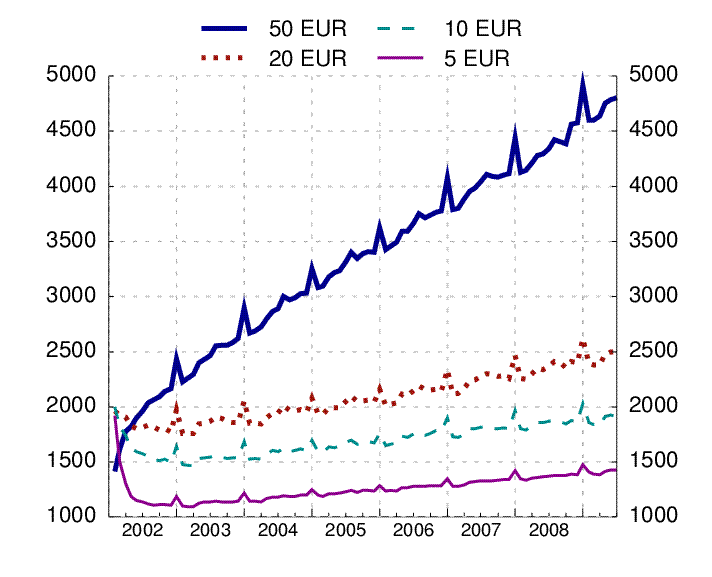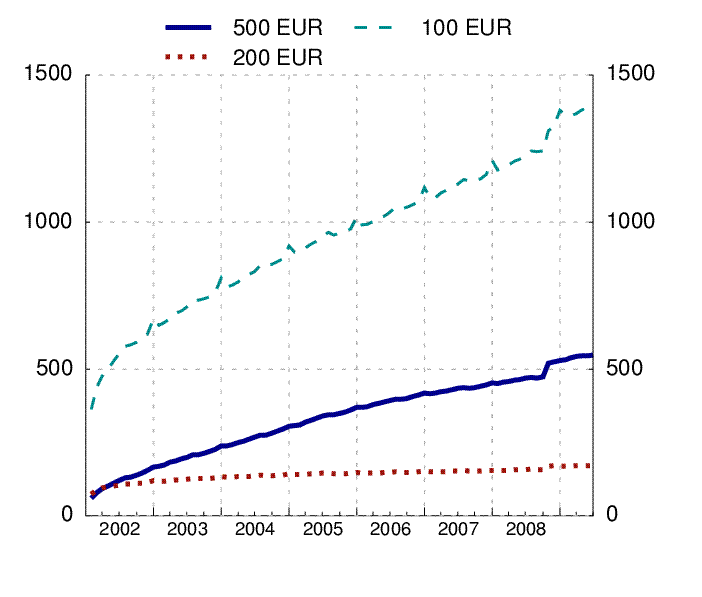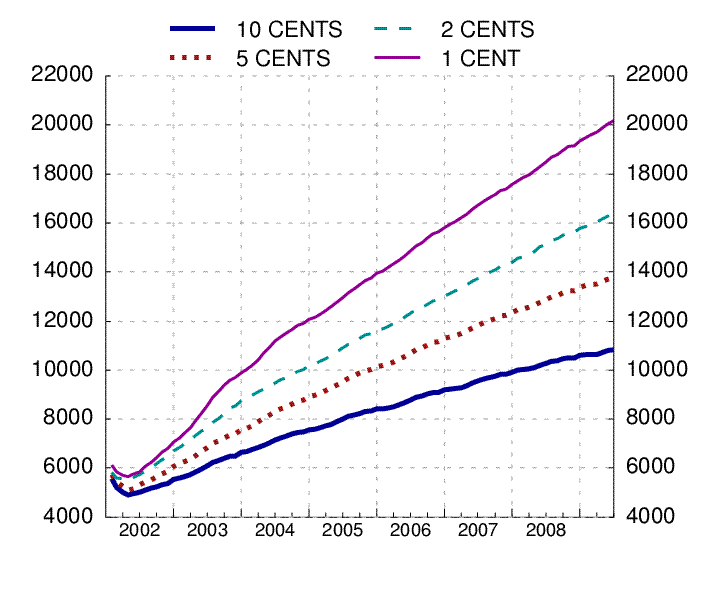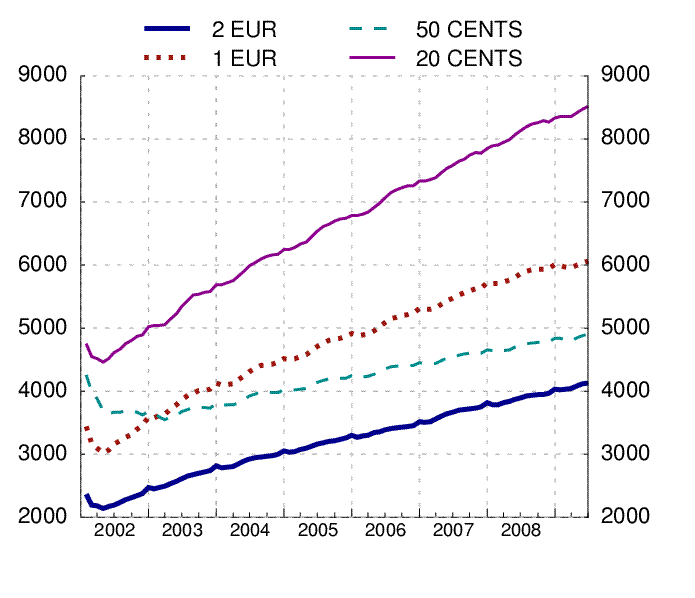 | |||||||||||
| :: November 2009 | Newsletter n°62 :: | |||||||||||
 |
|||||||||||
ESTA Business Conference 2010 registration has openedThe next Conference takes place on 13 to 15 June, 2010 in Porto, Portugal. You would not want to miss out on this networking opportunity! As always, ESTA has selected its conference venue with great care and has opted for the Porto Palacio Congress Hotel & SPA, which is specifically geared towards business and leisure tourism, with an exquisite quality environment! As always, ESTA has selected its conference venue with great care and has opted for the Porto Palacio Congress Hotel & SPA, which is specifically geared towards business and leisure tourism, with an exquisite quality environment! www.hotelportopalacio.com The working sessions will see three main themes debated: The cash cycle of the new decade, EU upcoming legislation impacting on the CIT industry, Recycling, Liability and Security issues. Top level speakers from ECB, National Central Banks, European Commission, National authorities together with ESTA Members will present and confront their views in an animated debate. ESTA offers the possibility to participate in the exhibition and to sponsor a service during the conference. Take this opportunity to make your company more visible during the conference. As the conference is set around fascinating cultural facilities, ESTA has decided to launch  a Ladies Programme, which includes tailored tours in English, a cruise with lunch at Douro River and Porto wine tasting. a Ladies Programme, which includes tailored tours in English, a cruise with lunch at Douro River and Porto wine tasting.ESTA has managed to book a limited number of rooms, so make sure to organise your Hotel booking in time! The Hotel registration has been separated from the Conference registration and consequently has to be completed and sent separately to ESTA and the Hotel organisers. More details on the conference can be taken from the following document: Practical Information document, Hotel registration, Conference registration, Exhibition and Sponsorship, Ladies Programme and Ladies registration form. The ESTA Organizing Committee will be working very hard to make this ESTA conference, once more, an interesting and successful event. With your support and attendance it will be the highlight of the year 2010. We look forward to welcoming you in Porto! EU AffairsEC White Paper on cross border CITThe Commission has held several meetings with the Member States representatives and the following items are reported as changed: Cross-border transportation of euro cash shall be carried out during daytime and the cash-in-transit (CIT) vehicle shall depart from and return to its country of origin in the same day. Daytime means 6.00-22.00, subject to a possible agreement between the social partners at European level. A CIT-vehicle operating under the envisaged common rules may make as many cash deliveries and pick-ups in another euro-area country as is feasible during this day. A majority of the cash deliveries/pick-ups must, however, be carried out in the host country (in the White Paper this was not specified, meaning that one stop abroad was enough). This is intended to ensure that the common cross-border rules are not used for transports that are predominantly domestic in nature. There must be at least three CIT security staff per vehicle. If a homologated end-to-end intelligent banknote neutralisation system (IBNS) is used there must be at least two CIT security staff per vehicle. Strict standards are foreseen for armoured CIT vehicles. CIT security staff in armoured vehicles must wear bullet-proof vests. CIT-staff shall have successfully followed at least 200 hours of ad hoc initial training, (not counting possible training on the use of firearms). This training shall include, inter alia, the cross-border CIT-procedures, the relevant national CIT-legislations, the rules of behaviour in case of attack, the use of the CIT-equipments and the team working rules. The length of the initial training and its content is subject to a possible agreement between the social partners at European level. CIT-staff must comply with the national legislation in each Member State as regards the carrying of weapons and the maximum permitted calibre (the possible alternative of a 'European firearms pass for CIT security staff' which was suggested in the White Paper has been dropped). A company wishing to carry out cross-border euro cash transport must have a CIT cross-border licence. In order to qualify, it must be approved to carry out CIT-transport in its Member State of origin. If the Member State does not have any specific approval procedure in place for CIT-companies, the company must be able to provide evidence that it has been carrying out regular cash transports during twenty-four months with no infringements of the existing national legislation (in the White Paper twelve months were enough). There are four transport options for euro banknotes/banknotes & coins: unarmoured vehicle equipped with end-to-end IBNS, cabin-armoured vehicle equipped with end-to-end IBNS, fully-armoured vehicle without end-to-end IBNS, fully-armoured vehicle equipped with end-to-end IBNS) and two for transports of euro coins only (unarmoured and cabin-armoured). Member States may decide to opt out from each of the transport options that are allowed under the common rules, but not from all the banknote options or both coin-only options at the same time. Penalties, ranging from a warning to a withdrawal of the cross-border CIT-licence, are foreseen in case of infringement of the common rules. Whereas it is the Member State that granted the cross-border licence (the Member State of origin) that has the main responsibility for penalties, the right of the host Member State to impose a penalty is expanded. It is envisaged that the right of the host Member State to issue penalties shall cover not only non-respect of the minimum number of staff or the national weapons rules, but also infringements of possible national derogations from the different transport options, of possible national rules on relations with the national police force or on possible national rules governing the handling of cash outside the CIT-vehicle.
Cash in circulation the latest data from ECB:Information received by the European Central Bank shows that cash continues to grow: The number of Euro notes in circulation at the end of Q3 2009 stood at 12823 million, with a value of 769,3 billion, an increase of 0,58%, respectively 0,69% since Q2 2009 and viewed between Q1 and Q2, an increase of 3,48% and 2,27% respectively. In Q3 the total number of Euro coins in circulation grew to 85805 million, while their value rose to 20961 million, a slight increase of 1,1% and 0,9% respectively since Q2 2009. The ECB information shows a stronger increase during the first half of 2009, whereby the total number of Euro coins in circulation grew with 2,14% and their value rose with 2% comparing Q1 with Q2. The trend shows an increase in numbers during 2009 with the largest growth in Q2. These are the graphs:
NCBs and Credit Institutions number of branchesFollow the link to find the ECB table which shows the number of branches of credit institutions and of national central banks (NCBs) providing cash services in the euro area. Source: ECB. Last updated: 30 September 2009. Reference period: end-2008 Cards FraudATMMarketPlace has recently published the outcome of a study conducted by ACI Worldwide and evidencing that one in five consumers had been victimized by card fraud! Norkoms fourth annual survey reports that 250 global financial crime professionals say measures taken by their organisations to reduce costs in the wake of last years financial crisis are leaving them and their customers increasingly vulnerable to criminal attack! War on CashAt a recent presentation by the Dutch Retail Association to ICCOS EMEA Conference in September 2009, their spokesperson stated that Dutch Retailers want to minimize if not eradicate cash in stores. A similar action has just been initiated in Belgium and Sweden. ESTA is currently considering an appropriate response to these biased initiatives which ignore the merits of cash as the preferred consumers method of payment and a generator of substantial revenues to the Member States. Internal AffairsThe latest Board meeting has approved the application of the following companies: Effective members: Fina (Croatia) Associate members: Brinks (Australia) Adherent members: Smartwater and Wincor Nixdorf (Germany) Swine FluAs a professional industry we do need to be fully informed about this current threat and our Adherent Member Marsh has kindly offered its guidelines, Swine Flu Risk Management to all ESTA members. New ESTA contactAs of today, we kindly advise you to use the following e-mail adresses for future communications to the ESTA secretariat: For general inquires regarding administration, documents, conference: contact@esta-cash.eu For specific questions to the Secretary General: francis.ravez@esta-cash.eu |
|||||||||||
|
ESTA - European Security Transport Association Rond Point Schuman 6 - B5, Brussels, 1040, Belgium Tel: +32(0)2 234 78 20 www.esta-cash.eu, contact@esta-cash.eu |



